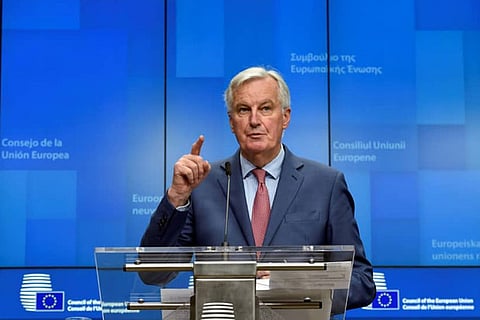

Brexit negotiator Michel Barnier and the Union's Austrian rotating presidency said the negotiated text would be presented to EU leaders at a signing summit on Sunday.
"The first, difficult step is done," said Austrian minister for Europe Gernot Blumel, whose country holds the rotating EU presidency, after the ministers met.
Meanwhile, detailed discussions continue on a parallel political statement setting out the bloc's ambitions for future relations with post-Brexit Britain -- and on a possible extension to the transition period.
Britain will leave the Union on March 29 next year, but remain within its single market for a further 21 months as negotiators seek a deal to avoid a potential breakdown in trade between the key economic partners.
If no deal remains in sight within this period, Britain can request a one-off extension. Barnier has suggested that this should expire at the end of 2022, but he admitted that the other 27 member states have yet to sign off on this date.
"I think that during this week we'll have a definitive proposition for this date. The decision will be made jointly between the United Kingdom and the 27," Barnier said.
Neither European member states, who want to protect access to their single market by non-member Britain, nor hardline British Brexiteers, who fear being trapped in a bloc where they don't make the rules, want an endless transition.
Barnier stressed it was Prime Minister Theresa May's government that had requested the extension option and that he had agreed to it to reassure nervous businesses, but warned: "It can't be indefinite. It needs to be decided." Meanwhile, preparations for Sunday's summit, where May and her 27 colleagues will sign the withdrawal agreement, continue apace.
"A painful week in European politics is starting," Blomel said. "We have the divorce papers on the table. Forty-five years of difficult marriage are coming to an end." May has said she will be in the city herself this week to see the president of the EU commission, Jean-Claude Juncker, for last-ditch talks on the future relationship.
"Now that there is a concept withdrawal agreement we think that it is satisfying, it's workable, and we will invest our energy now in the political agreement," Dutch foreign minister Stef Blok said.
London wants to lay out in as much detail as possible a route to a free trade agreement, in part to shore up support in a British parliament that may yet reject the deal.
Brussels, meanwhile, insists Britain cannot have the same privileged access to the single market as it did as a member state after Brexit on March 29 next year.
European negotiators plan to publish their version of the statement on future relations on Tuesday.
On Sunday, according to diplomatic sources, EU ambassadors fleshed out the document from just over six pages to around 20 as more details were agreed.
"We now have an intense week of negotiations ahead of us," May will tell British business leaders on Monday, according to Downing Street.
"And I am confident that we can strike a deal at the council that I can take back to the House of Commons."
While the EU 27 have remained publicly united through the 17-month negotiation, Britain's political camps are fighting a bitter civil war.
Conservative hardliners and May's Northern Irish unionist allies have pledged to vote down the treaty despite the threat of a calamitous no-deal Brexit.
And the opposition Labour Party, scenting a chance to topple May's government, has also warned that its members will not support her deal.
EU officials are surprised by the furious debate and mostly refuse to intervene, but French minister for Europe Nathalie Loiseau said both sides had "exhausted their margin to manoeuvre".
Blok said it was imperative that the political statement "lays the foundation of our future relationship, it has to be ambitious".
Some member states were annoyed that their rights to fish in British waters were not guaranteed in the withdrawal deal and have been left to future talks.
And Spain also has concerns about the future status of Gibraltar, the British territory on its southern coast.
But Europe's grumbles have stayed largely in the background, with EU ambassadors agreeing "not to pour oil into the British fire," a diplomat said.
Belgium's Foreign Minister Didier Reynders said of the deal: "Here, it will survive. We are waiting for the same situation in London, but here in Brussels it will survive."
Visit news.dtnext.in to explore our interactive epaper!
Download the DT Next app for more exciting features!
Click here for iOS
Click here for Android